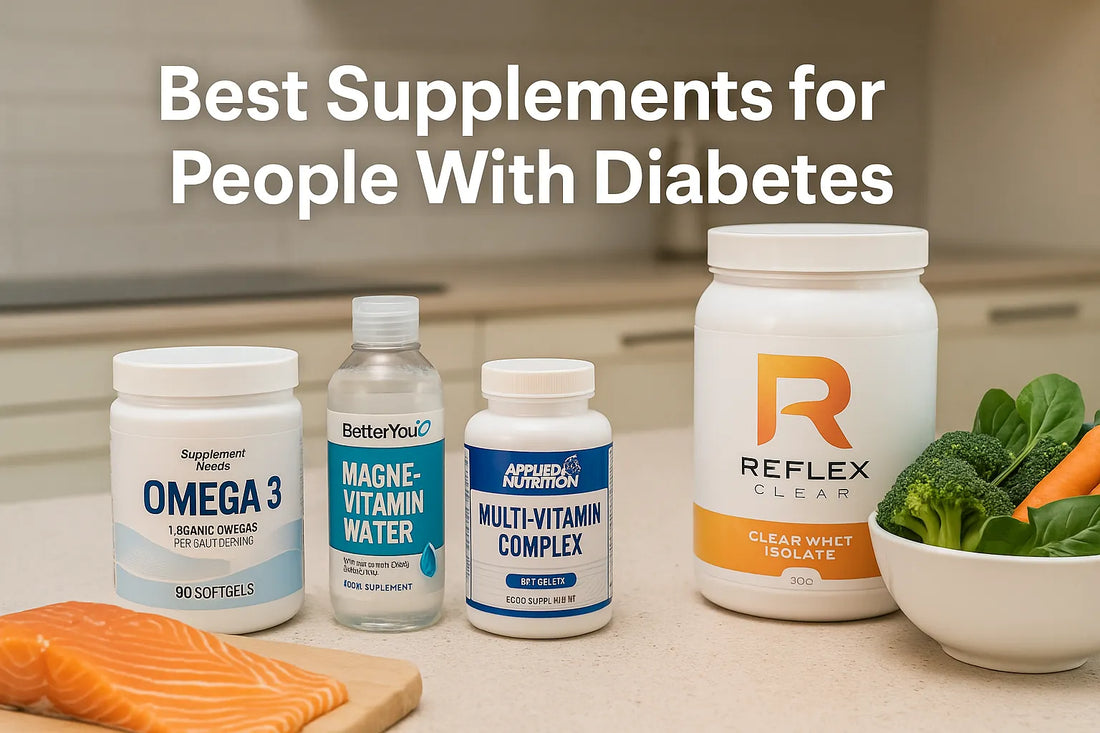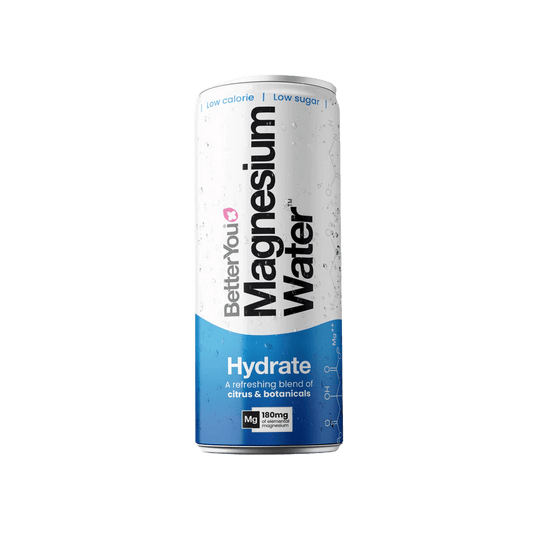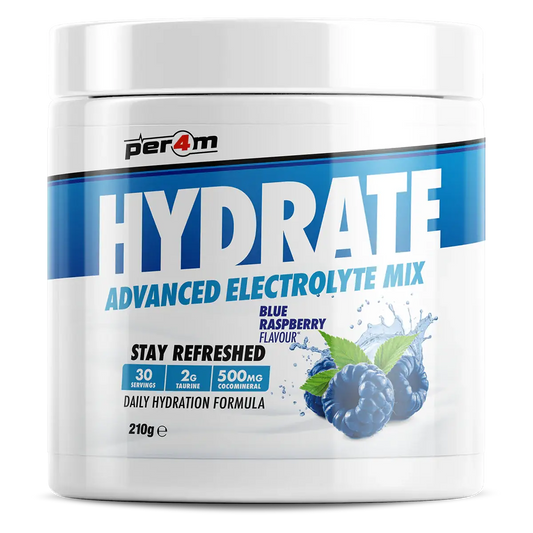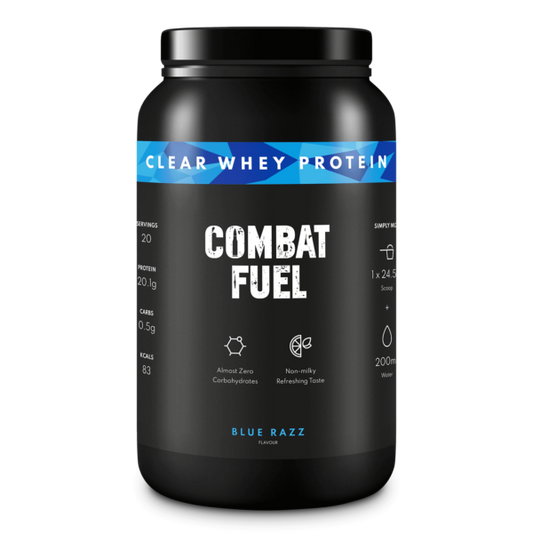Introduction: Supplements and Diabetes — What’s the Real Story?
Living with diabetes often feels like a constant balancing act. Blood sugar monitoring, food choices, exercise routines, and sometimes medication — it can feel like there’s always another plate to keep spinning. Understandably, many people ask the same question: “Are there supplements that can actually help?”
The truth is, supplements aren’t a cure. They won’t replace medication or lifestyle changes. But for people with diabetes, the right supplements can fill nutrient gaps, support blood sugar balance, reduce inflammation, and improve overall energy and wellbeing.
In this guide, we’ll break down the best supplements for people with diabetes, backed by science and explained in plain English. From essential vitamins to herbal adaptogens, we’ll show you what works, what to avoid, and how to make supplements a safe and smart part of your routine.
1) What Is the Best Supplement for Diabetics?
The frustrating answer? There isn’t just one. Diabetes affects multiple systems in the body — your heart, your metabolism, your nerves, even your sleep patterns. That’s why the “best” supplement isn’t a single capsule, but rather a small toolkit of nutrients that address different needs.
Here are three that consistently stand out in research:
-
Magnesium: Supports insulin sensitivity and muscle function.
-
Omega-3: Reduces inflammation, supports heart health.
-
Vitamin D: Linked to improved glucose control and immunity.
💡 This is why Supplement Needs Omega 3 is such a smart choice. It’s a pure, high-quality source of essential fatty acids that help reduce inflammation and protect the heart — two major concerns for people with diabetes. Taken daily, it complements diet and lifestyle changes without overstating its role.

2) What Should Diabetics Avoid?
It’s not just about what you should take — it’s about what to steer clear of. The supplement market is huge, and not all products are safe or useful for people managing blood sugar.
-
High-sugar supplements: Some gummy vitamins or flavoured powders sneak in sugar. Always check the label.
-
Stimulant-heavy fat burners or pre-workouts: These can spike blood pressure and stress the cardiovascular system.
-
“Miracle cure” blends: If a product claims it will “reverse diabetes overnight,” it’s marketing nonsense, not science.
Instead, aim for trusted, well-dosed essentials. A great example is Applied Nutrition Multi-Vitamin Complex. It provides a broad base of nutrients without unnecessary fillers, sugar, or hype. Think of it as a nutritional safety net — covering gaps without getting in the way of your diabetes management plan.
3) How Can I Improve My Diabetes?
This is the big question most people ask. The honest answer: supplements alone won’t improve diabetes. The pillars are still:
-
A balanced, lower-GI diet.
-
Regular physical activity.
-
Medication (if prescribed).
-
Stress management and quality sleep.
But supplements can support those pillars. For example:
-
Magnesium supports insulin sensitivity, making it easier for your body to use glucose effectively.
-
Omega-3 reduces inflammation, which plays a role in insulin resistance.
-
Vitamin D supports immune health, which is often compromised in people with diabetes.
💡 A smart, simple addition is BetterYou Magnesium Water. Easy to use and convenient, it tops up a mineral that many people with diabetes are deficient in — and deficiency here can make blood sugar harder to control.

4) Do Diabetics Need Supplements?
Strictly speaking, no one “needs” supplements if their diet is flawless. But here’s the reality: most diets aren’t flawless, and people with diabetes are at higher risk of certain deficiencies.
For example:
-
Magnesium deficiency is more common in those with type 2 diabetes.
-
Vitamin D deficiency is widespread in the UK, especially in winter.
-
Omega-3 intake tends to be low unless you eat oily fish several times a week.
Supplements are a way to level the playing field. They ensure your body has the raw materials to function at its best, even when food intake isn’t perfect. Think of them as insurance — not a replacement for good nutrition, but a reliable back-up.

5) Which Supplements Should Diabetics Avoid?
Not all supplements are created equal. For people with diabetes, certain products can do more harm than good:
-
High-sugar protein powders: Some blends sneak in added carbs for flavour.
-
Unregulated herbal mixes: Especially those bought from non-UK sources.
-
Unnecessary fat burners: These can interfere with medication and blood pressure.
Instead, choose products with transparency and trust. For example, Combat Fuel Clear Whey is an excellent protein source with minimal carbs and sugar. It gives you the recovery support you need without jeopardising blood sugar control.
✅ End of Part 1
So far, we’ve covered:
-
The best supplement categories for diabetes.
-
What to avoid (and why).
-
How supplements can support, not replace, lifestyle improvements.
-
The role of deficiencies and why they matter.
The four key products we’ve seen so far:
- Supplement Needs Omega 3
- Applied Nutrition Multi-Vitamin Complex
- BetterYou Magnesium Water
- Combat Fuel Clear Whey
🔜 Part 2 will cover:
-
Supplements that lower blood sugar.
-
Natural ways to support diabetes management.
-
Reducing HbA1c levels.
-
Morning routines and safe vitamin use.
- A detailed FAQ + conclusion.
Best Supplements for People With Diabetes (Part 2)
6) What Supplements Lower Blood Sugar?
When it comes to managing blood sugar, some supplements show more promise than others. While no supplement can replace medication or a healthy diet, several nutrients have been shown to support better glucose control:
-
Magnesium: Helps improve insulin sensitivity and glucose uptake.
-
Omega-3 fatty acids: Reduce inflammation and may improve markers of metabolic health.
-
Chromium: Plays a role in carbohydrate metabolism.
-
Herbal adaptogens: Ashwagandha has been studied for its cortisol-lowering effects, which indirectly improve glucose regulation.
💡 Supplement Needs Ashwagandha is particularly useful here. By reducing stress hormones, it helps balance blood sugar indirectly — especially for those who notice spikes when under pressure.
7) How to Reduce Diabetes Naturally?
Natural doesn’t mean easy, but it does mean sustainable. Lifestyle remains the first line of defence:
-
Diet: Prioritise low-GI foods, plenty of fibre, and lean protein.
-
Exercise: Resistance training and regular movement help muscles absorb glucose.
-
Sleep: Poor sleep makes blood sugar harder to control.
-
Stress management: Chronic stress = higher cortisol = higher blood sugar.
Supplements can play a supportive role in this “natural” approach. Magnesium and omega-3 help your body respond to glucose. A good multivitamin ensures deficiencies aren’t making things worse. And ashwagandha smooths the stress response so you don’t spike blood sugar every time life throws you a curveball.

8) How to Reduce HbA1c Level?
HbA1c is one of the key markers for diabetes — it reflects average blood sugar levels over the past three months. Lowering HbA1c is about consistency, not quick fixes.
Here’s where supplements can contribute:
-
Magnesium: Improves insulin action over time.
-
Vitamin D: Linked to improved HbA1c in several studies.
-
Omega-3: Reduces systemic inflammation, helping long-term blood sugar stability.
💡 Per4m Hydrate Electrolyte Mix may sound like a sports drink, but for people with diabetes, hydration is crucial for keeping HbA1c under control. Proper hydration helps the kidneys flush excess glucose and keeps blood sugar readings steadier.
9) What Should Diabetics Drink First Thing in the Morning?
The best answer is simple: water. After hours of fasting overnight, your body needs hydration more than anything. For an extra edge, water with added electrolytes can help balance hydration and support glucose control.
Other safe options include:
-
Black coffee (in moderation — watch caffeine tolerance).
-
Green tea (gentle antioxidants without added sugar).
-
Electrolyte mixes (low- or no-sugar formulas).
💡 Per4m Hydrate Electrolyte Mix makes a great morning option — replenishing fluids without sneaky sugars that can spike blood glucose.
10) Can I Take Vitamins if I Am Diabetic?
Absolutely. In fact, multivitamins are often more important for people with diabetes because the condition increases the risk of deficiencies. For example:
-
B vitamins are crucial for energy metabolism.
-
Vitamin D supports immunity and glucose control.
-
Magnesium influences insulin action.
The key is choosing the right formulation. Avoid sugary gummies or cheap blends with unnecessary fillers.
💡 Applied Nutrition Multi-Vitamin Complex is a reliable choice for a daily vitamin foundation. It’s designed to provide essential nutrients without hidden extras that could complicate blood sugar management.

🧠 FAQ: Supplements and Diabetes
1. What supplements help regulate blood sugar?
Magnesium, chromium, omega-3, vitamin D, and adaptogens like ashwagandha.
2. Are supplements safe for people with diabetes?
Yes — when used responsibly and alongside lifestyle and medical care. Always avoid unregulated “miracle cure” products.
3. What vitamins should diabetics take daily?
Vitamin D, magnesium, and a high-quality multivitamin to cover common gaps.
4. Can omega-3 help people with diabetes?
Yes — omega-3 reduces inflammation and protects cardiovascular health, which is vital for diabetics.
5. What are the best natural supplements for diabetes management?
Ashwagandha, magnesium, omega-3, vitamin D, and a solid multivitamin.
Conclusion: Supplements as Part of the Diabetes Toolkit
Supplements aren’t a cure for diabetes — and they never should be sold as one. But the right nutrients can help make daily management easier, smoother, and more effective. Magnesium supports insulin sensitivity. Omega-3 calms inflammation. Vitamin D and multivitamins cover the basics. Ashwagandha helps you manage the stress that often drives blood sugar spikes. And clean, low-sugar proteins like Combat Fuel Clear Whey keep recovery on track without hidden carbs.
The real magic comes when you pair these smart supplements with lifestyle changes — balanced meals, daily movement, quality sleep, and good hydration. Together, they build a foundation of resilience that helps people with diabetes live not just longer, but better.
At Uncle Gym, we’re committed to offering only safe, high-quality supplements that support your journey. No gimmicks, no overpromises — just products that work when you use them right.





